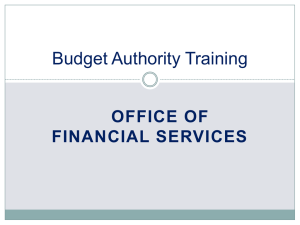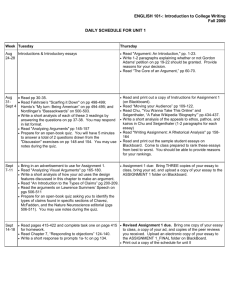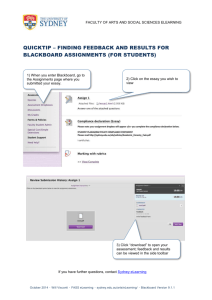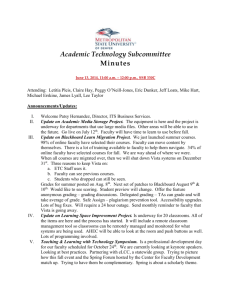ENGL 5390: Studies in Composition – History and Theory of
advertisement
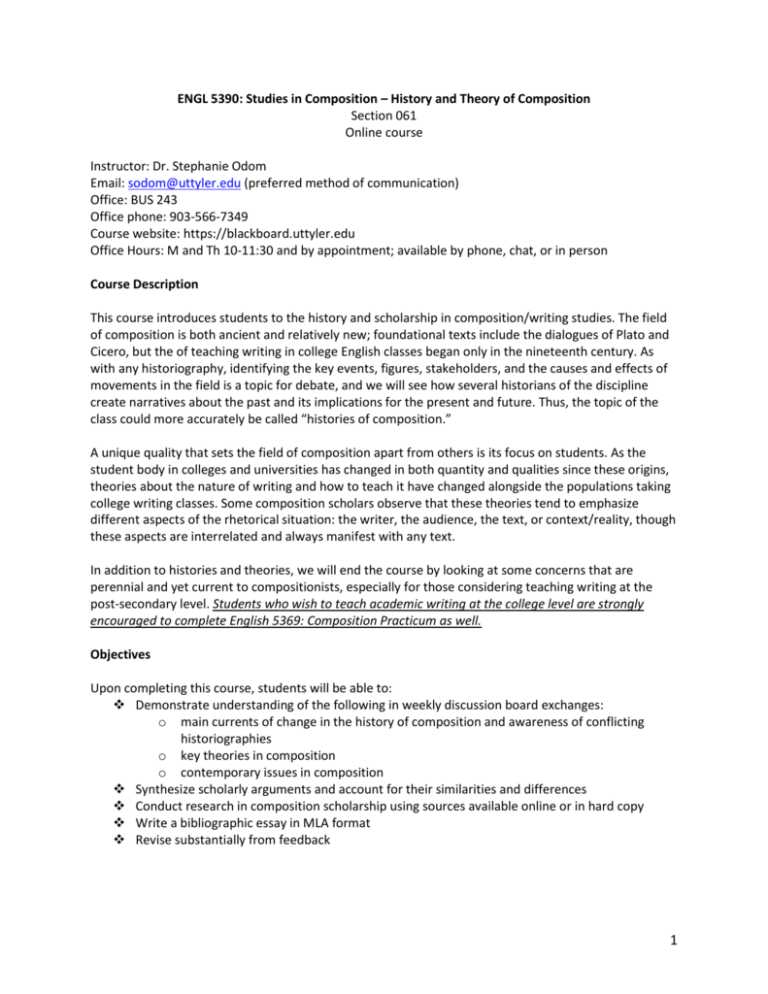
ENGL 5390: Studies in Composition – History and Theory of Composition Section 061 Online course Instructor: Dr. Stephanie Odom Email: sodom@uttyler.edu (preferred method of communication) Office: BUS 243 Office phone: 903-566-7349 Course website: https://blackboard.uttyler.edu Office Hours: M and Th 10-11:30 and by appointment; available by phone, chat, or in person Course Description This course introduces students to the history and scholarship in composition/writing studies. The field of composition is both ancient and relatively new; foundational texts include the dialogues of Plato and Cicero, but the of teaching writing in college English classes began only in the nineteenth century. As with any historiography, identifying the key events, figures, stakeholders, and the causes and effects of movements in the field is a topic for debate, and we will see how several historians of the discipline create narratives about the past and its implications for the present and future. Thus, the topic of the class could more accurately be called “histories of composition.” A unique quality that sets the field of composition apart from others is its focus on students. As the student body in colleges and universities has changed in both quantity and qualities since these origins, theories about the nature of writing and how to teach it have changed alongside the populations taking college writing classes. Some composition scholars observe that these theories tend to emphasize different aspects of the rhetorical situation: the writer, the audience, the text, or context/reality, though these aspects are interrelated and always manifest with any text. In addition to histories and theories, we will end the course by looking at some concerns that are perennial and yet current to compositionists, especially for those considering teaching writing at the post-secondary level. Students who wish to teach academic writing at the college level are strongly encouraged to complete English 5369: Composition Practicum as well. Objectives Upon completing this course, students will be able to: Demonstrate understanding of the following in weekly discussion board exchanges: o main currents of change in the history of composition and awareness of conflicting historiographies o key theories in composition o contemporary issues in composition Synthesize scholarly arguments and account for their similarities and differences Conduct research in composition scholarship using sources available online or in hard copy Write a bibliographic essay in MLA format Revise substantially from feedback 1 Required Texts Your textbooks are available from the bookstore or online sources. Norton Book of Composition Studies, Susan Miller, ed. W.W. Norton and Company, 2009. ISBN: 9780393931358 Rhetorics, Poetics, and Cultures. James Berlin. Parlor Press, 2003. ISBN: 9780972477284 Selected PDFs to be downloaded from Blackboard Grading Policy Papers will receive letter grades on the +/- scale. Discussion board posts will be graded on a 10- and 5point scale, outlined in the discussion board rubric on Blackboard. Final grades will be assigned whole letter grades. A = 90-100 B = 80-89 C = 70-79 D = 60-69 F = 59 and below Assignment Weight Words Due Date Synthesis Paper 10% 750 M, 1/26 Footnote Trail Exercise 10% 750 M, 2/16 Annotated Bibliography 15% TBD W, 3/4 Bibliographic Essay 15% 1500 W, 4/1 Revised Bibliographic Essay 20% 1500 W, 4/22 Discussion Board Posts 25% 250 Ongoing Reading Questions 15% varies Ongoing Revision Knowing how to revise based on feedback is essential for any writer, but our weekly schedule makes it difficult to schedule multiple drafts of writing assignments. You’ll revise your bibliographic essay according to my feedback but this is the only required revision. You may submit any other writing assignment (except for discussion board posts and reading questions) for revision. You must let me know that you plan to revise within 24 hours of receiving the grade and then I will take up an additional 24 hours to provide you with substantial feedback. You will then have an additional week to substantially revise the assignment for a new grade. I will devote a lot of time and thought into giving you comments on how to revise your writing. If you turn in the same assignment 2 without substantial revision, you will receive a lower grade on the revised assignment than you did on the original. The original grade and the revision grade will be averaged and recorded. Students who provide evidence of collaboration/peer review before the due dates on any assignment can receive an additional 1/3 letter grade on the paper. This includes visiting the writing center or having a classmate comment on your draft. The Writing Center The UT Tyler Writing Center is a free service available to you for working with a trained writing tutor on your writing. They can help you one-on-one, in person or online, at any stage of the writing process. They are located in BUS 202 and you can look up their hours and other information at http://www.uttyler.edu/writingcenter/. Late Assignments All papers will be submitted to me via Blackboard and due at 10:00 a.m. (central time zone) on the date noted. Each day that an assignment is late, a full letter grade will be detracted. For example, for papers due at 10:00 a.m. on Monday: - one letter grade if turned in after 10:00 a.m. on Monday but before 9:59 p.m. on Tuesday - two letter grades if turned in before 10:00 a.m. on Wednesday, and so on. Technology Requirements: 1. Access to a computer (PC or Mac), personal or campus 2. Internet access with the ability to view and listen to video and audio recordings. (High-speed is preferred; Blackboard, videos, podcasts and ZOOM may be slow to load on satellite or dial-up.) 3. Microsoft Office is strongly recommended. You may use instead a Word and PowerPointcompatible program such as Apple iWork or Apache Open Office (free) to view handouts and presentations. 4. A free ZOOM account. Visit the ZOOM.us web site to create an account. NOTE: The campus IT department has arranged for student discounts on several software packages on the HiEd website. See Blackboard entry on Composing under “Getting Started” for information about a free version of Microsoft Office. For Engl 5390 online, you must be able to: 1. Send and receive email from your UT Tyler patriots email account I expect that you will check your Patriots email at least once a day. I will ordinarily respond to email within 24 hours, more promptly between 10-2 M-F. 2. Access and navigate UT Tyler Blackboard 3. Create, attach, receive, and open Microsoft Word documents 4. Post to discussion board forums on Blackboard 5. Open PDF files 6. Play and view video and audio files 3 Plug-ins and Helper Applications: UT Tyler online courses use Java, JavaScript, browser plug-ins, helper application and cookies. You need to have these elements installed and enabled in your web browser for optimal viewing of the content and functions of your online course. Always ensure that you are using the most updated version for the browser you choose to access the online learning content. 1. Mozilla Firefox is the recommended browser for Blackboard (http://www.mozilla.org/enUS/firefox/new/) 2. Adobe Reader allows you to view, save, and print Portable Document Format (PDF) files (http://get.adobe.com/reader/) 3. Java Runtime Environment (JRE) allows you to use interactive tools on the web (http://www.java.com/en/download/) 4. Adobe Flash Player allows you to view content created with Flash such as interactive web applications and animations (http://get.adobe.com/flashplayer/) 5. QuickTime allows users to play back audio and video files (http://www.apple.com/quicktime/download/) 6. Windows Media Player allows you to view, listen and download streaming video and audio (http://windows.microsoft.com/en-US/windows/products/windows-media-player) Help with Technology: For tutorials on how to use Blackboard, please click on the Help tab located on the upper right hand corner of this page. If you have issues with logins, connectivity, or with general computer support, email itsupport@patriots.uttyler.edu or contact the IT Support Hotline at (903) 565-5555. In Blackboard, I’ll give you more specific information about word processing methods and saving your work. Scholastic Honesty Turning in work that is not your own, or any other form of scholastic dishonesty, will result in a major course penalty, possibly failure of the course. This standard applies to all drafts and assignments, so if you have any doubts about your use of sources or collaboration, ask me for help before handing in the assignment. UT Tyler’s policies on scholastic dishonesty can be found here: http://www.uttyler.edu/judicialaffairs/scholasticdishonesty.php University Policies: See http://www.uttyler.edu/academicaffairs/syllabuspolicies.pdf 4 Course Schedule NBCS = Norton Book of Composition Studies PDF: available for download on Blackboard DB = Discussion board on Blackboard All assigned work is due in Blackboard (not by email) at 10:00 a.m. central time on the designated day. Wk Date Topic 1 M, 1/12 W, 1/14 F, 1/16 Introduce Synthesis Paper assignment M, 1/19 Early history of composition as a discipline 2 3 4 5 W, 1/21 M, 1/26 W, 1/28 M, 2/2 W, 2/4 M, 2/9 Reading Due M, 2/16 W, 2/18 Paper Returned DB self-introduction NBCS “Introduction” (xxxv-xlvi) NBCS: Parker (316), Horner (33-52), Douglas (74-97) DB reading post; Reading questions DB reading post; Reading questions DB response End of Add/Drop period; Berlin’s history of composition Rhetorics, Poetics, and Cultures (xi-82) Synthesis Paper; Reading questions DB response Berlin’s history of composition con’t Rhetorics, Poetics, and Cultures (82140) DB reading post; Reading questions Synthesis Paper DB response Late 20th century history and theories; introduce Footnote Trail Exercise PDF: Gold et al; NCBS Fulkerson (430-435); Hairston (439-450) W, 2/11 6 Assignment Due Process theory Selections from NBCS and PDFs to be decided DB reading post; Reading questions; Optional revision of Synthesis Paper DB response; Optional revision of Synthesis Paper Footnote Trail Exercise; Reading questions DB response 5 7 8 M, 2/23 W, 2/25 M, 3/2 Rhetorical theory; Introduce Annotated Bibliography assignment PDF: Graff (ch. from DB reading post TSIS); Fleming (ch. from Guide to Comp Pedg); Swales DB response Expressivist theory Selections from NBCS and PDFs to be decided W, 3/4 9 10 11 M, 3/9 W, 3/11 M, 3/16 W, 3/18 M, 3/23 W, 3/25 M, 3/30 13 M, 4/6 W, 4/8 M, 4/13 DB reading post; Annotated Bibliography; Reading questions; Optional revision of Footnote Trail Exercise SPRING BREAK SPRING BREAK Empirical research Selections from NBCS and PDFs to be decided DB reading post; Reading questions DB response Last Day to Withdraw from Classes; Political/critical theories Selections from NBCS and PDFs to be decided DB reading post; Reading questions Annotated Bibliography DB response TBD Selections from NBCS and PDFs to be decided W, 4/1 12 Footnote Trail Exercise Style/correctness Selections from NBCS and PDFs to be decided DB reading post; Reading questions Bibliographic Essay; DB response; Optional revision of Annotated Bibliographic Essay DB reading post; Reading questions DB response Technology Selections from NBCS and PDFs to be decided DB reading post; Reading questions Bib Essay 6 14 W, 4/15 M, 4/20 DB response Labor issues Selections from NBCS and PDFs to be decided W, 4/22 DB reading post; Reading questions Revised Bibliographic Essay No final exam. 7
